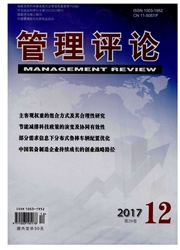

 中文摘要:
中文摘要:
先前的研究主要集中于CEO过度自信对公司投资的负面影响,然而CEO过度自信对公司某些投资的积极影响却很少受到学者们的关注。基于资源基础观和高阶梯队理论,构建一个被中介的调节模型来揭示CEO过度自信对IT投资和公司绩效之间关系的内在影响机制。以我国2007—2013年全部上市公司为样本,采用调节路径分析(Moderated Path Analysis)的方法检验被中介的调节模型,实证结果显示,(1)IT投资对公司绩效具有积极的促进作用;(2)CEO过度自信对IT投资和公司绩效之间的关系具有显著的正向调节效应;(3)R&D投入在CEO过度自信对IT投资和公司绩效之间关系的正向调节效应中起中介作用。表明过度自信的CEO是一种重要的IT补充性资源,其不仅自身对IT投资和公司绩效之间关系具有积极的影响,而且CEO过度自信通过影响公司R&D投入的强度,使公司对IT投资具有更强的吸收能力,使IT投资的潜力和其对公司绩效的影响得以更充分的发挥。该发现丰富并发展了IT绩效研究和过度自信研究的相关内容,拓展了高阶梯队理论,对公司IT投资活动有重要实践启示。
 英文摘要:
英文摘要:
Prior researches have focused on CEO overconfidence'negative effects on corporation investments,but CEO overconfidence'positive effects on corporate investments have been largely neglected in the literature to date. Drawing on resource-based view and Upper Echelon Theory,a mediated moderation model which explains how CEO overconfidence moderates the relationship between IT investments and firm performance is constructed and moderated path analysis is used to test this prediction by using Chinese listed firms from2007 to 2013. The empirical results show that IT investment has a positive impact on firm performance; CEO overconfidence has significant positive moderating effects on that relationship between IT investments and firm performance; RD expenditure mediates the moderating effect of CEO overconfidence on the effect of IT investments in firm performance. This study reveals CEO overconfidence is an important IT complementary resource. CEO overconfidence not only has significant positive moderating effects on that relationship between IT investments and firm performance,but also leads to larger investment in RD and a stronger capacity to absorb IT investment,thus giving full play to the potential of IT investment and its effect on firm performance. These findings expand related IT performance research,overconfidence research,Upper Echelon Theory and provide important practical implications for corporate IT investment.
 同期刊论文项目
同期刊论文项目
 同项目期刊论文
同项目期刊论文
 The Credit Risk Evaluation Index System Construction in Commercial Banks Based on BP Neural Network.
The Credit Risk Evaluation Index System Construction in Commercial Banks Based on BP Neural Network. Challenges to China’s New Stock Market for Small and Medium-Size Firms: Trading Price Falls Below th
Challenges to China’s New Stock Market for Small and Medium-Size Firms: Trading Price Falls Below th Proximal Point Algorithms for Convex Multi-Criteria Optimization with Applications to Supply Chain R
Proximal Point Algorithms for Convex Multi-Criteria Optimization with Applications to Supply Chain R The Application of Time-Delay-Dependent Control in the Transmission Effect of Monetary Policy on Rea
The Application of Time-Delay-Dependent Control in the Transmission Effect of Monetary Policy on Rea Complementary Technology and Long-Term Shareholder Value of Acquiring Firm in Technology Acquisition
Complementary Technology and Long-Term Shareholder Value of Acquiring Firm in Technology Acquisition Research on Commercial Bank Credit Risk Evaluation Model Based on the Integration of the Probability
Research on Commercial Bank Credit Risk Evaluation Model Based on the Integration of the Probability Growth Enterprise Board Initial Public Offerings: Characteristics, Volatility and the Initial-day Pe
Growth Enterprise Board Initial Public Offerings: Characteristics, Volatility and the Initial-day Pe Exact Finite-Difference Schemes for -Dimensional Linear Stochastic Systems with Constant Coefficient
Exact Finite-Difference Schemes for -Dimensional Linear Stochastic Systems with Constant Coefficient 期刊信息
期刊信息
